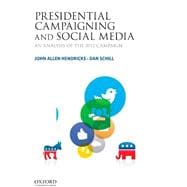Social media are revolutionizing the American electoral process. Their integral role in facilitating campaign communication and networking has rapidly evolved into a standard element of candidate strategy, voter engagement, and media reporting.
Featuring work by an esteemed line-up of contributors, Presidential Campaigning and Social Media: An Analysis of the 2012 Campaign is the first book to provide a detailed analysis of the role that social media and social networking sites (SNS)--including Facebook, Twitter, YouTube, Tumblr, Google+, Instagram, Pinterest, and others--played in the 2012 Republican presidential primaries and the general election campaign. Using both quantitative and qualitative methodological approaches, the book thoroughly examines the 2012 campaign's use of each form of social media technology and social networking sites and considers which strategies were effective in connecting with and motivating the electorate to vote. Presidential Campaigning and Social Media is ideal for courses in campaigns and elections.








